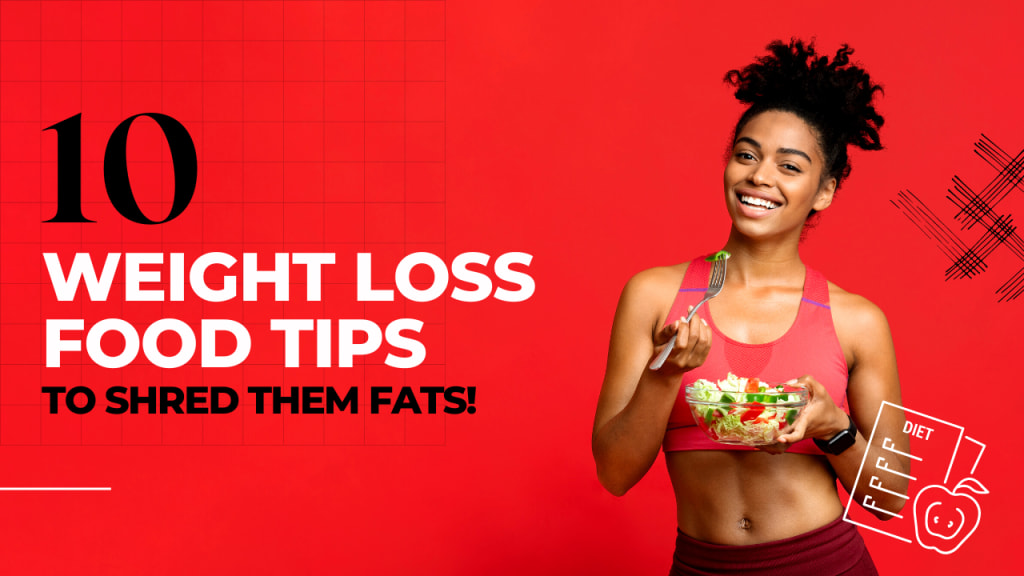10 Proven Weight Loss Tips That Actually Work
Are you looking for a way to shed those extra pounds? The journey to weight loss can be a challenging one and it often feels like there are endless tips and tricks out there that promise to help you achieve your goals. But the truth is, not all tips work and some can even backfire. That’s why it’s important to find the tips and tricks that actually work and that you can stick to. Here are 10 proven weight loss tips that have been scientifically proven to help you lose weight and keep it off. Each one is simple, easy to understand, and most importantly, effective!

1. Set realistic goals
As you embark on your weight loss journey, it’s important to set realistic goals. You don’t want to set such high goals that you get discouraged and quit before you even get started. Instead, set goals that you know you can achieve and that are based on your current health and fitness level. As you meet those goals, you can set new ones. This will help keep you motivated and on track. It’s also important to go into your weight loss journey with a positive mindset. It can be easy to get down on yourself when you’re trying to lose weight, but you need to stay positive.
This supplement can help you burn pounds in weeks. No kidding. Click here to check it out!
2. Increase your water intake
When it comes to weight loss, water is your best friend. It can help you lose weight, reduce cravings, and improve your overall health. It’s recommended that you drink half your body weight in ounces of water each day. For example, if you weigh 150 pounds, you should drink 75 ounces of water each day. This includes both plain water and water-based beverages like tea, coffee, and sparkling water. When you drink enough water, it can help you avoid overeating by making you feel full and it can also boost your metabolism. Studies have even shown that people who drink water regularly before a meal consume fewer overall calories than those who don’t drink water before a meal.
3. Get enough sleep
You’ve probably heard that you should get at least eight hours of sleep each night, but did you know that it’s important for weight loss? Getting enough sleep can help you lose weight, reduce cravings, and improve your overall health. Not getting enough sleep can negatively impact your hormones, metabolism, and appetite. Studies have shown that getting seven hours of sleep or less leads to an increase in the hormone known as ghrelin, which is responsible for increasing appetite. On the other hand, getting nine hours of sleep each night can reduce the amount of ghrelin your body produces, which can lead to a decreased appetite.
4. Eat more fiber
For a long time, people believed that eating fiber would cause you to gain weight. Thankfully, new research has proven that this isn’t the case. In fact, eating enough fiber can actually help you lose weight. It can also reduce your risk of developing certain diseases, like heart disease and type 2 diabetes. Getting enough fiber in your diet can be difficult. The average American only eats half the recommended amount of fiber. Luckily, there are plenty of foods that are high in fiber, including whole grains, beans, fruits, and veggies. You can also find fiber supplements in many health food stores.
5. Eat protein with every meal
Eating protein can help you lose weight as well as reduce your risk of developing certain diseases. It’s important that you incorporate protein into your diet, especially if you’re trying to lose weight. The best time to eat protein is at breakfast, lunch and dinner. You can do this by adding protein to your morning oatmeal, having a salad with grilled chicken for lunch, and eating beans and rice for dinner. Eating protein at every meal can help you lose weight, reduce your risk of developing heart disease, and improve your metabolism.
6. Cut back on added sugar
Approximately 75% of all packaged foods contain added sugar. This includes many foods that are considered “diet” or “sugar-free”. These types of foods are generally bad for your health, and when trying to lose weight, you should avoid them as much as possible. Eating too much sugar can lead to weight gain and can negatively impact your metabolism. It can also lead to insulin resistance, which is a precursor to developing type 2 diabetes. Cutting back on added sugar can be challenging, especially when it’s in so many foods, but it’s worth it. You’ll notice a difference in how you feel both physically and mentally. Your mood will improve and you’ll have more energy.
7. Avoid unhealthy processed foods
When you’re trying to lose weight, it’s important to avoid eating processed foods. You should steer clear of packaged foods that contain high-fructose corn syrup, refined grains, or soybean oil. These foods are generally high in sugar and unhealthy fats, such as hydrogenated oils. It’s also important to read the labels on processed foods, as many of them are high in sodium, a nutrient that can cause you to gain weight if you eat too much of it. It’s recommended that you limit your daily sodium intake to around 2,300 milligrams. Eating healthy, whole foods, such as fruits, veggies, and beans, will help you lose weight.
8. Incorporate physical activity into your daily routine
Studies have shown that it takes 3,500 calories to lose one pound of fat. That means if you want to lose one pound, you need to create a deficit of 3,500 calories. One way to do this is by incorporating physical activity into your daily routine. It’s recommended that you get 150 minutes of moderate aerobic exercise each week. You can do this by walking for 30 minutes each day, taking a yoga class once a week, or cycling for 30 minutes each weekend. If you can’t fit in 150 minutes of exercise each week, don’t stress. Even if you can only squeeze in 10 minutes a day, you’re still doing better than nothing.
9. Track your progress
As you’re losing weight, it’s important to track your progress. This way, you can see how much you’ve accomplished and stay motivated to keep going. There are a variety of ways you can track your progress, such as keeping a journal, taking before and after photos, or even keeping a spreadsheet. Keeping track of your progress can also help you see where you need to make changes. For example, if you notice that you’re not losing as much weight as you would like, you may need to change up your diet or start exercising more. Whatever method works best for you is the best way to track your progress.
10. Be mindful of your eating habits
It’s important to be mindful of your eating habits if you want to lose weight. What does this mean, exactly? It means that you should pay attention to things like the size of your portions, when you eat, and even how you eat. For example, you should avoid eating while you’re distracted, such as when you’re watching TV or surfing the internet. This can lead to overeating. Additionally, you should pay attention to how much you’re eating. Most people don’t realize that they eat more than they need. When it comes to weight loss, there are endless tips and tricks out there. The trick is finding the right ones, and sticking to them. These 10 proven weight loss tips are simple, easy to understand, and most importantly, effective. They’ll help you shed those extra pounds and keep them off for good.
This supplement can help you burn pounds in weeks. No kidding. Click here to check it out!
About the Creator
The Monster Code
The Monster Code aims to help people achieve their life goals such as Fitness, Losing Weight, Making Money or simply for Daily motivation.






Comments
There are no comments for this story
Be the first to respond and start the conversation.